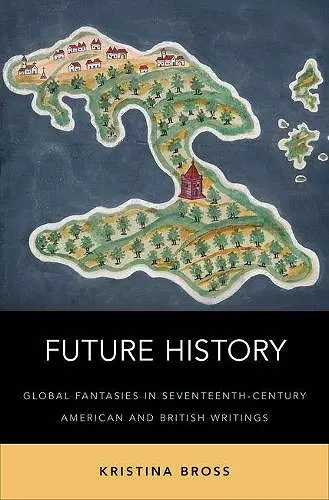Future History
Global Fantasies in Seventeenth-Century American and British Writings
Format:Hardback
Publisher:Oxford University Press Inc
Published:16th Nov '17
Currently unavailable, and unfortunately no date known when it will be back

CHOICE Outstanding Academic Title (2018)
Future History traces the ways that English and American writers oriented themselves along an East-West axis to fantasize their place in the world.Future History traces the ways that English and American writers oriented themselves along an East-West axis to fantasize their place in the world. The book builds on new transoceanic scholarship and recent calls to approach early American studies from a global perspective. Such scholarship has largely focused on the early national period; Bross's work begins earlier and considers the intertwined identities of America, other English colonial sites and metropolitan England during a period before nation-state identities were hardened into the forms we know them today, when an English empire was nascent, not realized, and when a global perspective such as we might recognize it was just coming into focus for early modern Europeans. The author examines works that imagine England on a global stage in the Americas and East Indies just as--and in some cases even before--England occupied such spaces in force. Future History considers works written from the 1620s to the 1670s, but the center of gravity of Future History is writing at the mid-century, that is, writings coincident with the Interregnum, a time when England plotted and launched ambitious, often violent schemes to conquer, colonize or otherwise appropriate other lands, driven by both mercantile and religious desires.
Future History is a provocative and stimulating contribution to the field of early modern Anglophone Atlantic studies. Bross's interdisciplinary in-terrogation of globalization, religion, book history, and commerce, along-side her theoretical exploration of an expanded concept of the archive, colonial fantasy, and "true relations," provides fresh insights into the archives and texts that underlie all scholarly attempts to write literary history and challenge us to rethink and restructure the ways we excavate, interpret, and tell such stories. * Alison Searle, Early American Literature *
How to describe this wonderful book? It is an account of how writers of the past - one past - imagined a longed-for future, how a poorly organized and under-resourced people on the fringe of Europe envisioned its divinely sanctioned global domination, how the Americas and Asia emerged as dual fascinations for the early modern English as interconnected sources of both material wealth and spiritual salvation. It is an eloquent meditation on the many accidents and intentional actions that produce archives, with their eccentric shapes, textures, and absences, along with surprises that speak truth to power. Future History is a must-read for those who would know how the seventeenth-century English imagined themselves into their future, but also for those seeking a passionate articulation of how the labor of humanists matters for our urgent present day. * Laura M. Stevens, The University of Tulsa *
Future History offers a highly engaging, even provocative, consideration of England's interactions with and imaginings of the world. Kristina Bross's insightful readings open new ways of understanding the origins of British engagement with the world. In a sense a companion volume to Alison Game's Cosmopolitans, Bross's work also stands on its own as a monumental achievement. * Carla Gardina Pestana, UCLA *
Bross's Future History brings a much-needed and eye-opening global global perspective to the study of seventeenth-century English writing, reminding us that America and Asia alike were part of a proto-imperial English vision whose imagined future rested on present violence. This book will change the way scholars across disciplines understand early modern archives and spaces. * Michelle Burnham, Santa Clara University *
- Winner of ^BCHOICE Outstanding Academic Title (2018)^R.
ISBN: 9780190665135
Dimensions: 157mm x 239mm x 25mm
Weight: 499g
248 pages